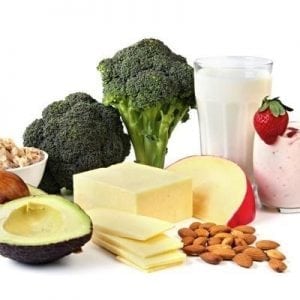
Myo-inositol is mostly obtained from corn (corn steep liquor)
Myo-inositol, a vitamin in the extensive B-complex group, is a main component of the cell membrane, thus an important component of cell growth. Myo-inositol also helps maintain healthy insulin levels. This B-vitamin also affects the brain metabolism of the future mother and facilitates the body’s own production of the “happy” hormone serotonin – a gift for any anxious woman during this time of high stress. Studies have shown that in the three months before fertilization, higher levels of myo-inositol in the follicle liquid is one of the factors that indicates improved egg quality. Many women might already know of inositol as a particularly skin-friendly vitamin; but in addition to this, you can see it is also of great importance to the rest of the body.

Contains L-arginine: hazelnuts, peanuts, cereal products, meat, fish, eggs and milk
The amino acid L-arginine supports healthy blood flow to the reproductive organs and helps to create optimal conditions for embryo implantation. In particular, the formation of protein-similar mucus in the uterus can be attributed to this amino acid.

Contains vitamin C: citrus fruit, rose hip, sweet peppers, broccoli, strawberries, kiwis, black currants, potatoes, liver, kidney
Vitamin C (ascorbic acid) is a water-soluble vitamin whose important task consists of protecting tissue structure, cell membranes and cell components like proteins and enzymes against oxidative damage by free radicals. The danger of these damages occurring increases with increased metabolism, as occurs with physical effort, acute diseases, and during pregnancy.

Contains vitamin E: soybeans, vegetable oils, sweet peppers, spinach, asparagus, nuts, eggs
Likewise, Vitamin E (tocopherol) protects against oxidative stress, and promotes the healing of existing oxidative damage. As a fat-soluble vitamin, it is present especially in cell membranes, where it exerts its antioxidant effects in addition to supporting and strengthening the effects of vitamin C.

Contains vitamin B6: meat, fish, yeast, potatoes, milk, cheese, egg-yolk
The different substances that are part of the vitamin B-complex serve around the clock as important components of the various enzymes that direct key processes involved in metabolism. From this group, B6 is best taken in the morning, while all others are most effective in the evening.

Contains vitamin K: green vegetables, cabbage family vegetables, potatoes, tomatoes, liver, meat, fish, milk
Vitamin K is necessary for the formation of several clotting factors in the liver.
If a vitamin K deficiency is present, it may lead to life-threatening bleeding. A vitamin K deficiency seems to accompany an increased risk of abortion, especially in the first days after conception.

Contains vitamin D: fish (eel, salmon), cod-liver oil, veal, egg-yolk, milk, butter, avocados
Vitamin D increases the absorption of calcium and phosphate from food in the intestine, and promotes the activation and mineralization of these two minerals in the bones. Therefore, the necessary calcium levels are maintained in the blood by increasing the absorption of calcium from ingested food, and decreasing its loss through the kidneys.

Contains carotenoids: carrots, tomatoes, sweet peppers, lettuce, spinach, broccoli and mangoes.
Carotenoids supply a preliminary form of vitamin A to a woman’s body. There’s a reason the first letter in the alphabet is dedicated to vitamin A; it fulfills important reproduction-related tasks during cell division and growth. The preliminary form of vitamin A, also known as beta-carotene, is first among those nutrients that protect the body against harmful substances and pathogens and support the immune system. Carotenoids are generally classified as very effective protective substances because of their strong antioxidant properties, helping the body fight and neutralize aggressive free radicals. The body manufactures exactly the required amount of organic-active vitamin A from beta-carotene, making overdosing is improbable.

Fruitflow® is extracted from tomatoes and supports healthy blood circulation
Special molecules found in tomatoes have been recognized by the European Food Safety Authority EFSA as the very first botanical substances to produce a desired health effect. These substances, found in the patented formula Fruitflow®, produced convincing results relating to the optimization of healthy blood flow in seven scientific studies – addressing a timely concern in this day and age.

Contains calcium: milk and milk products (hard cheeses), avocado, broccoli, almonds, whole grains, legumes
Important trace elements such as selenium, chromium, molybdenum, iodine, calcium, and other bone-friendly nutrients must be stored in the body in sufficient quantities at the time of fertilization and before the formation of the woman’s placenta. Iodine deficiency ranks among the most common causes of developmental disturbances during pregnancy world-wide. Elements and minerals like molybdenum support the effectiveness of amino acids and enzymes, especially if they are supplied chronobiologically, in the correct combination with them. A balanced supply of calcium is also necessary for the fertilized egg to implant properly and develop into a full-blown pregnancy.
